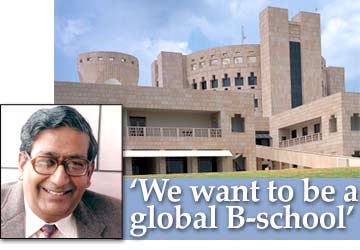 | « Back to article | Print this article |

The sprawling campus of Indian School of Business at Gachibowli on the outskirts of Hyderabad is a much sought after destination these days.
Within three years of being set up, ISB has emerged as one of the most prestigious business schools in India.
ISB's governing board comprises business leaders, entrepreneurs and academicians from some of the world's leading business and management education institutions. Its partnership with the Kellogg School of Management, The Wharton School and London Business School makes ISB one of its kind in Asia.
Professor Mendu Rammohan Rao took over as the Dean of ISB early this year. His sole aim now is to bring cutting-edge global research into the school to make in a globally reputed institution.
Rao, who headed the Indian Institute of Management, Bangalore, before he took charge at ISB, is an illustrious academic, renowned worldwide for his research and teaching abilities.
Rao earlier taught as operations research at the Stern School of Business, New York University.
"I want to establish ISB as a thought leader in management education and research in Asia," says Rao in an exclusive interview to Deputy Managing Editor George Iype.
Is ISB the best business school in India today?
We are not comparing. Comparing business schools is like comparing apples and oranges. But what I want to say is that we are positioned differently.
We believe that business is a force for good. Our school wants to be the hub for cutting-edge research on issues affecting high growth emerging economies. We have a one-year postgraduate programme, unlike the general two-year MBA at other institutes.
Our model is getting people with an average two years of work experience. The average number of experience for our students is around five. The average age is 27. Our idea is not to really think in terms of becoming the best in India. We want to position as a global business school.
In a few years, ISB has become one of the best-known business schools in India. How did that happen?
People have worked hard on the project. Our partner schools from abroad -- Kellogg, Wharton and London Business School -- and our executive board members, who are corporative executives, have helped.
Our aspiration is to create synergies between India, Asia and the global business environment. We have been able to achieve a lot, but still there is a long way to go.
What is your recruitment policy?
We have a good recruitment policy. We have what we call 'lateral placements.' From most of the business schools such as IIMs (Indian Institutes of Management), MBAs are recruited at the entry-level management. Our placement always is lateral, at a higher level because our students have already work experiences.
Each company takes very few people from us. So we have to get more companies here on the campus to recruit. Our last batch was 219 and all the students were placed in good companies.
What was the average salary?
Last year, it was around Rs 9 lakh (Rs 900,000). That is one of the best in India.
What is your fee structure?
Our total fee -- including stay and food is Rs 13.9 lakh (Rs 1.39 million) for the one-year programme.
How do you react to the fee controversy that gripped the Indian Institutes of Management last year?
I think whatever IIMs are charging now is probably lower than what they should charge.
IIMs should be permitted to charge the fee they are comfortable with. I never understood why the government wanted to reduce the fees.
 Always, IIMs have been giving scholarships, even though they have not been much advertising the scholarships. The point is that anybody who is admitted to IIMs is not denied education because of lack of financial resources. IIMs either ensure loans or scholarships.
Always, IIMs have been giving scholarships, even though they have not been much advertising the scholarships. The point is that anybody who is admitted to IIMs is not denied education because of lack of financial resources. IIMs either ensure loans or scholarships.
IIMs were always doing that. The fee-cut was not at all necessary. After all, IIMs are capable of running themselves, without getting funding from the government.
Do you think the Indian business schools are creating two classes of people: one section of students which has the money to study and another section which does not have the financial resources to enter the business schools.
That is not true. Our policy is that anyone who is admitted will not be denied education because of lack of money. We give lots of scholarships. We need to increase these scholarships also. We are already setting up a part of the fees towards scholarships. We have some scholarships given by companies.
Our stated policy is that anyone who is admitted in ISB will not deprived or denied of education because of lack of money. So I don't think the Indian business schools are creating two classes of people.
See, many of our students are not all that rich. They are not also all from the metropolitan cities. They are from smaller cities. We are going out to smaller cities also to recruit people from all sections of society. Most of them are studying here with bank loans.
Over the years, many business schools have sprung up across the country? Why?
That is partially unfortunate. There are about 1,000 business schools in the country that give MBAs or other similar courses. But sadly, several of them are not doing well. I was the chairman of the All India Board of Management Studies for an year or so.
We looked and studied very closely the proliferation of the business schools in India. Many of them are not at all good institutions.
But there are some good private institutions also. I think what has happened is that there has been lots of demand and hype for business studies that people just started institutions. But many students get out of these institutions are not getting good jobs. It is really a sad situation.
So running business schools is also a money-making business?
Some of them are, indeed. But not all of them. So you have to distinguish between good ones and bad ones. The good ones provide excellent facilities. So they have to charge higher fees.
There are also bad ones, who do not provide any good education and charge higher fees. There should be a regulatory body to prevent the proliferation of business schools in the country. The regulatory body should curb or prevent the bad, money-making business schools.
It is important to realize that there are institutions, which are good and not good. We must do something about institutions that are not good; especially those that overcharge. We should curb and bring them under control, rather than put restrictions on those who are doing well and providing all the facilities.
These business schools are churning out thousands of MBAs every year. Do you think the Indian industry has the capacity to absorb and employ them?
If the quality of the MBA students is good, yes, the Indian industry has the capacity to absorb them. But the catch is, really, the quality. I do not know how many MBAs are of good quality out of the thousands of students who pass out every year.
I would be very surprised if 500 of them are of high, or reasonably good quality.
What is the biggest problem facing the business schools in India?
The biggest problem that many business schools in India face today is that there is an acute shortage of faculty. I cannot fully blame the institutes for not maintaining the quality, because they are unable to get good faculty. Everyone is trying to get good faculty and they are unable to get.
If they cannot get good faculty, naturally the programmes cannot go ahead in the right direction.
Do you think there has been a boom in business schools because there is an economic boom in India?
Yes. There is a lot of demand for business graduates in India. Each institute should look up and plan as to what they plan to do for the country, for the industry. We should not think that all the institutions should be like the IIMs or IITs (Indian Institutes of Technology).
Do you plan to start any ISB branch outside India?
Not right now. We want to stabilise now and then chalk out the future. We want to grow in India. Our emphasis is different. We want to increase our student strength to 560 or 600 in the next five years.
What is the nature of your tie up with Wharton, Kellogg and LBS?
It is an academic tie-up. They help us formulate the curriculum development and the academic programmes. The faculty members from these three business schools come here and teach. Of course, we pay their faculty.
 ISB and the three institutes jointly sign the certificates. We want to now set up some centers of excellence. We have centers of excellence in entrepreneurship and analytical finance. We will be starting centers in strategic marketing, technology, leadership and change management, and manufacturing logistics and supply chair.
ISB and the three institutes jointly sign the certificates. We want to now set up some centers of excellence. We have centers of excellence in entrepreneurship and analytical finance. We will be starting centers in strategic marketing, technology, leadership and change management, and manufacturing logistics and supply chair.
Our collaboration with Wharton, Kellogg and LBS help in structuring these centers, in faculty in research, development of faculty, recruitment of faculty. We do not have any financial tie ups with these foreign schools.
Do you think the Indian business schools have grown in stature as India has progress economically over the years?
Yes, IIMs and other business schools have grown in stature after India began liberalising its economy in 1991. They were allowed to raise their own funds. I think institutes like ISB have come up because of the economic reforms.
The Indian industry itself has changed a lot in the last decade or so. And the academia has changed. Now there is a lot more interest in India, a lot more interest to do business research in India. That is our core emphasis at ISB.
We want to do cutting-edge research in emerging economy at ISB. The economy has been doing well, led by software. Now the software fever has spread to other fields. People now say in software if you can do, why not in other areas also.
Our manufacturing is also picking up. And we need to do lots of educational service for the industry in India.